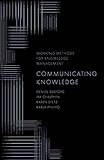Communicating knowledge
Series: Working methods for knowledge managementPublication details: Emerald Publishing 2022 BingleyDescription: 242pISBN:- 9781802621044
- 658.4038 BED
| Item type | Current library | Collection | Call number | Status | Date due | Barcode | Item holds | |
|---|---|---|---|---|---|---|---|---|
 Book
Book
|
Jammu General Stacks | Non-fiction | 658.4038 BED (Browse shelf(Opens below)) | Available | IIMJ-6349 |
Table of contents: Section 1. Communicating knowledge Chapter 1. Shifting landscape of organizational communications Chapter 2. Communicating knowledge in the new world of work Chapter 3. Knowledge capital and knowledge mobilization Chapter 4. Designing management communication for the knowledge economy Section 2. Communicating knowledge assets Chapter 5. Communicating human capital Chapter 6. Communicating structural capital Chapter 7. Communicating relational capital Section 3. Key issues in knowledge communications Chapter 8. Discernment as a management issue Chapter 9. Listening as a management issue Chapter 10. Facilitation as a management issue Chapter 11. Decision making as a management issue Chapter 12. Team building as a management issue Section 4. Building communications competencies and capacity Chapter 13. Building communications competencies Chapter 14. Building communications capacity
The communication of knowledge is a core concept in the field of knowledge management and an essential new role and responsibility of business managers. Knowledge capital is the primary source of wealth and the key source of productivity in the knowledge economy. Stockpiling and storing knowledge diminishes its value. It is only through circulation that our knowledge capital realizes its business value. Communicating Knowledge addresses essential management practices in the 21st-century knowledge economy. It speaks to the change that every organization is experiencing as they transition from an industrial to a knowledge organization. The COVID-19 pandemic has heightened an awareness of communications practices in the past year, with communication norms and behaviors being challenged at every level. How we communicate, when we communicate, with whom we communicate, and what we communicate is currently undergoing a global reform. Communication competencies are no longer desirable qualities in managers - they are essential. This book is intended for business managers working at all levels, knowledge management practitioners and scholars, communications professionals, practitioners, and consultants.
There are no comments on this title.

